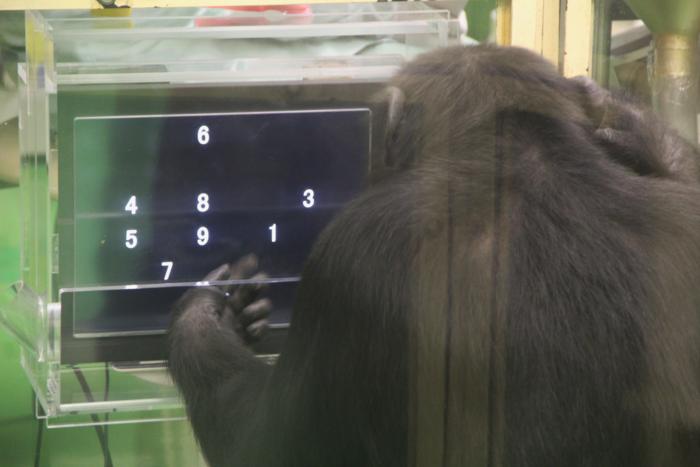Summary: A groundbreaking study reveals that chimpanzees’ performance on computer-based tasks changes significantly based on who’s watching them. In a surprising twist, the apes performed better on difficult tasks when more researchers were present, while their performance on simpler tasks declined with larger audiences.
Journal: iScience, November 8, 2024, DOI: 10.1016/j.isci.2024.111191 | Reading time: 4 minutes
The Power of an Audience
We’ve all felt it – that mix of pressure and motivation when people are watching us work. Now, researchers at Kyoto University have discovered that our closest evolutionary relatives, chimpanzees, experience similar reactions to being observed.
“It was very surprising to find that chimpanzees are affected in their task performance by audience members, and by human audience members nonetheless!” says lead researcher Christen Lin. “One might not expect a chimp to particularly care if another species is watching them perform a task.”
The study, published in iScience, analyzed thousands of sessions over six years where chimpanzees completed various touch-screen tasks. The research team found that the presence of human observers had dramatically different effects depending on the difficulty of the task at hand.
Complex Tasks Get a Boost
When faced with the most challenging memory-based tasks, chimpanzees actually performed better as more researchers watched them work. This finding suggests that the pressure of an audience might enhance focus and motivation for complex problem-solving – similar to how some humans report performing better under pressure.
The study site offered a unique opportunity to explore this phenomenon. “Our study site is special in that chimpanzees frequently interact with and even enjoy the company of humans here, participating almost daily in various touch screen experiments for food rewards,” explains researcher Akiho Muramatsu.
A Double-Edged Sword
However, the audience effect wasn’t uniformly positive. When performing simpler tasks, the chimpanzees’ performance declined as more people watched. This pattern mirrors human behavior, where audience pressure can sometimes interfere with basic tasks while enhancing performance on more engaging challenges.
“Our findings suggest that how much humans care about witnesses and audience members may not be quite so specific to our species,” says researcher Shinya Yamamoto. The results hint at deeper evolutionary roots for social awareness and performance anxiety than previously thought.
Key Terms
• Audience Effect: Changes in behavior or performance that occur when being watched by others.
• Social Facilitation: The tendency for people to perform differently on tasks when in the presence of others.
• Cognitive Load: The amount of mental effort and memory being used to complete a task.
• Touch Screen Task: In this study, computerized tests where chimps had to touch numbers in sequence.
Test Your Knowledge
1. How did chimpanzees perform on difficult tasks when more researchers were present?
Answer: They performed better with more researchers watching.
2. What happened to chimp performance on simple tasks with larger audiences?
Answer: Their performance declined with more observers.
3. How long did the study analyze chimp performance?
Answer: Six years.
4. What type of facility enabled this unique research?
Answer: A research facility where chimps regularly interact with humans and participate in touch screen experiments.
Enjoy this story? Get our newsletter! https://scienceblog.substack.com/
If our reporting has informed or inspired you, please consider making a donation. Every contribution, no matter the size, empowers us to continue delivering accurate, engaging, and trustworthy science and medical news. Independent journalism requires time, effort, and resources—your support ensures we can keep uncovering the stories that matter most to you.
Join us in making knowledge accessible and impactful. Thank you for standing with us!

